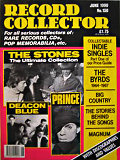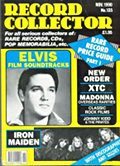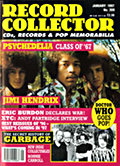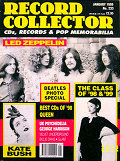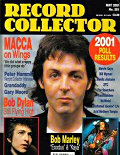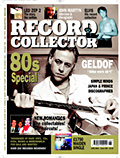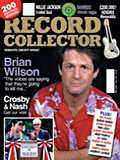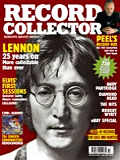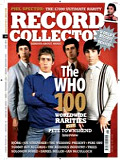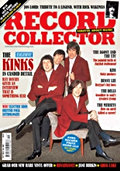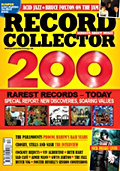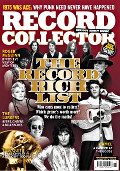XTC RECORDING HISTORY
No. 135, Nov. 1990
XTC: From Punk to
Psychedelic Pastiche
Gary Ramon traces the tangled history of
Wiltshire's finest pop and psych band
XTC are one of those quintessentially English bands who,
like the Kinks before them, enjoy more popularity in America than at home.
Having progressed from punk-rock origins, the Swindon band have issued ten
albums in their own right — two under their psychedelic alter-ego the
Dukes of Stratosphear — plus an armful of classic pop singles, many of
these in highly collectable editions. When we last featured them back in 1982,
XTC were about to embark on their ill-fated world tour, which proved to be
their last real concert dates. In that same article, we valued their debut 45,
“Science Friction”, at £3.50: today, that same disc, complete
with picture sleeve, is worth £70! For this update, which pays
particular attention to overseas rarities, we journey to Swindon to jog the
memory of the group's guitarist Dave Gregory.
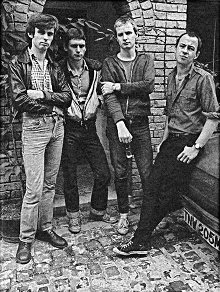
The band's roots date back to the mid-60s when Dave began taking an interest
in playing guitar. Around 1967, he formed a school band which, by the end of
the decade, had acquired the name The Pink Warmth (inspired by a petrol ad on
TV!). This psychedelic group performed irregularly at various youth clubs in
Swindon, one of which providing the meeting-place between Dave and 15-year-old
Andy Partridge, who'd just taken up the guitar. Over the next few years, the
pair met up at various guitar shops, where they auditioned new models and
traded the leading rock riffs of the day; but it wasn't until 1979 that they
actually teamed up in the same band.
Dave takes up the story: “Andy met Colin Moulding in the early
Seventies. He wasn't in a band or anything; he was just a rock fan, though
with a bit of coaxing from Andy, he decided to learn bass guitar. It was a
case of, ‘your hair's long enough, you can be in my band!’ Through
Colin, Terry Chambers joined on drums. They were augmented by a short-lived
guitarist Steve Phillips, and basically grew up together learning to play. In
those early days, they couldn't play very well — none of us could —
but they played very loudly and put off a lot of people around town!”
By the mid-Seventies, after constant practising and playing, the band
improved. Aided by Andy Partridge's rapidly-developing songwriting, and billed
as the Helium Kidz, they became an exciting live act. One witness compared
their early performances to watching a 3-D ‘Marvel’ comic with
bright primary colours come to life on stage. However original they were, the
band couldn't single-handedly shake the mood of the mid-70s, when the music
industry was virtually monopolised by guitar or keyboard virtuoso acts. Within
a year, that ethos would be broken by a new breed of guitar groups.
Organ
In 1976, the newly-christened XTC, now with Barry Andrews on organ, obtained
a handful of gigs at ‘The Affair’ in Swindon. Having established
themselves locally, the band next looked to London and booked some club dates.
With the capital buzzing to the sound of punk-rock, XTC quickly became seen as
part of a second new wave, alongside Elvis Costello, Squeeze and the
Police.
Virgin picked up on the group, hastily arranging a recording session with
produced John Leckie at Abbey Road studios around August/September 1977. A
debut 45, Science Friction, was rush-released on 7th October, complete
with limited edition picture sleeve. . . .
There was also a 12" edition, 3-D EP, which boasted a third track,
“Dance Band”. This was kept on Virgin's catalogue until the end of
the decade, and isn't that hard to find . . .
“Virgin assumed that Swindon was a hotbed of musical talent,”
Dave recalled, “and so they decided to put on a show to see who else they
could sign! By this time, I was in an R&B band called Dean Gabber &
His Gaberdines and, as well as us, there were about eight other Swindon bands
doing this show for the benefit of the A&R men, but nothing came of it. I
think XTC was a one-off!”
The second single, Statue of Liberty, [was] issued on 6th January
1978 . . . White Music, their album debut, followed soon
after, and was met with critical acclaim, prompting one journalist to call it:
“the equivalent to eating sherbet dip!”. With well-crafted songs,
it confirmed that the band's unique brand of high energy pop, laced with a
steam-powered organ sound, put them into a different league from their
contemporaries.
After the group set off on a tour of Europe supporting Talking Heads, Virgin
released a third single, This is Pop?, backed by the non-LP
“Heatwave”. . . .
By August, XTC were back in Abbey Road studios recording the Go 2
album, issued two months later. The first 15,000 copies came with a 5-track
12" EP called Go +, featuring dub versions, plus a two-sided gatefold
insert which included a map of Swindon! . . . Overseas
pressings didn't include the bonus 12" initially; instead the disc had an extra
track, “Are You Receiving Me?”, not included on U.K. pressings.
This song was subsequently released in its own right as XTC's fourth single on
27th October.
To promote the LP, the band toured the States — again with Talking
Heads — but on returning, Barry Andrews announced his intention to leave.
He had been far from happy with the inclusion of just two of his songs on Go
2 and left to record several solo singles, enjoy a brief spell with the
League of Gentlemen, before eventually settling with Shriekback.
Back in Swindon, Dave Gregory got the call from Andy Partridge requesting
him to join the band. An audition was quickly arranged at the group's
rehearsal studios on the outskirts of town, and on 27th January Dave became a
fully-fledged member. “I think it was a question of learning some new
songs and re-designing the band again, but I seriously didn't think I'd last
more than one album!”, recalls Dave today.
The new line-up debuted 12 days later on a session taped for Radio 1's Andy
Peebles, after which they began work on a new single, the first to be written
by bassist Colin Moulding. Life Begins At The Hop, coupled with an
off-the-wall Partridge instrumental “Homo Safari” (the first in a
series of six instrumentals), was issued on 4th May 1979, the first 30,000
appearing on clear vinyl with a gatefold insert inside a plastic printed
sleeve. Rarer still are edited DJ-only copies, again on clear
vinyl. . . . The song's up-tempo 60s flavour took the band to
within four places of the Top 50, close enough to warrant an appearance on
“Top Of The Pops”.
After a short U.K. tour, XTC reconvened at the newly-built Townhouse
studios. Dave recalls: “At the time, we were really getting into big
drum sounds, and I remember Andy saying to engineer Hugh Padgham, ‘I want
the drums to really knock your head off!’. That really was the start of
the big XTC drum sound which has since become an industry standard.”
Free
Drums and Wires, the band's third album, was issued on 17th August
with the first 20,000 copies containing a free 7" coupling “Chain of
Command” with “Limelight”. . .
Virgin, keen for another hit, pressed for the release of a second album
track, Colin Moulding's Making Plans for Nigel, as a single. Issued in
September, and coupled with two non-LP cuts, “Bushman President (Homo
Safari Series No. 2)” and “Pulsing, Pulsing”, the first
20,000 copies came in a fold-out game-board sleeve, complete with cardboard
playing pieces. . .
Nigel reached No. 19 and gave XTC a far higher public profile. Dave:
“The single came out while we were doing the Drums and Wires tour.
By the time we'd finished, it had become a hit so we ended up touring
constantly until Xmas. Things really started happening. All our gigs were
sold out and we were playing 2,000 seater cinemas instead of clubs. We finally
felt we were getting somewhere.”
To follow their first Top 20 hit, XTC recorded a new Andy Partridge song,
“Wait Till Your Boat Goes Down”, and a re-recording of “Ten
Feet Tall” from Drums and Wires, bringing in legendary 70's
glam-rock producer Phil Wainman for the session. “Ten Feet Tall”
was coupled with “Helicopter” and a new song, “The
Somnambulist” for their first U.S. 45, while in the U.K., “Wait
Till Your Boat Goes Down” was the top-side, issued in a
Partridge-designed sleeve in March 1980.
While the band were in the States, a solo album of sorts was issued by Andy
Partridge. Due to the success of the Go + EP (it was subsequently sold
separately from the Go 2 LP), he took the multi-track recordings of the
previous two LPs to a studio, electronically reprocessed some of the songs,
then rebuilt them with effects and the odd new lyric. The result was the
mid-price LP, Take Away (The Lure of Salvage), by Mr. Partridge.
Original pressings came in a brown textured sleeve. . . .
While Drums and Wires had caught the group between their old style
and a softer, more melodic approach, the next album, Black Sea, was a
much more definite statement by the new line-up. Initial quantities came in an
outer green paper sleeve and a lyric insert. Preceding the LP was another
Colin Moulding-penned 45, “Generals and Majors” with early copies
available as a double-pack backed with three non-LP cuts including
“Smokeless Zone” and “The Somnambulist”.
XTC broke the European leg of the world tour (with the Police and UB40) to
fly home and recreate a recording session for the BBC, who were making a
documentary on the group. This was later broadcast as XTC At The Manor
on BBC-2 in October 1980, and the song heavily featured on the special,
“Towers of London”, was rush-released on 10th October to coincide
with the screening. An edited version of the album cut, this was coupled with
a live recording of “Set Myself on Fire”, while additional
pressings housed in a plastic outer sleeve contained a bonus 7" of
“Scissor Man” (from a John Peel session) and “Battery
Brides” (live). . . Despite bearing all the hallmarks of a
classic pop song, the Partridge-penned single failed to chart.
Several other XTC rarities surfaced around this time, the first being The
Colonel's one and only single release, Too Many Cooks in the Kitchen.
The Colonel was Colin Moulding aided by Terry Chambers; the single was quickly
deleted. Also worth mentioning here is “Take This Town”, the
band's contribution to the Times Square film. The song appeared on the
soundtrack LP and was coupled with the Ruts' “Babylon's Burning” on
7".
The next track to be issued as a single from Black Sea was
“Sgt. Rock (Is Going to Help Me)”. . . Once again,
initial pressings featured something to attract the collectors, on this
occasion a fold-out poster sleeve. The real reason for buying the single,
though, was for live versions of “Living Through Another Cuba” and
“Generals and Majors” on the flip. For U.S. and Canadian
consumption, the record company chose to remix the song, which amounted to
little more than speeding it up!
Adjunct
In early 1981, as an adjunct to the U.S. tour, the group played some
unnerving dates in Venezuela. Dave recalls: “Caracas was like an
organised riot! We played on a circular stage, and at the front was a rope
where security guards stood to keep fans from getting too near us. The had
their swords drawn, ready to lash out at anyone who dared too near the rope,
but they didn't seem to mind that someone had stacked up chairs at the back of
the hall and set fire to them!”
The band returned home unscathed for the last leg of the Black Sea
tour, and performed for the very last time in England in Cardiff on 2nd June.
During the tour, one final single was squeezed from the album, Respectable
Street (with altered lyric), coupled with two new songs, “Strange
Tales, Strange Tails” and “Officer Blue”.
During preparations for their fifth album, several overseas compilations
surfaced. In Japan, the Live and More mini-LP collected various live
and studio non-album tracks, its sleeve die-cut to reveal a picture
label. . . Over in Canada, a similar exercise was performed, where
various B-sides were rounded up and issued as a five-track 12" EP Five
Senses.
Having spent some six weeks in the studios with producer Hugh Padgham (who'd
worked on Drums and Wires and Black Sea as Steve Lillywhite's
engineer), the group finished the record by the end of the year. As a taster,
Senses Working Overtime was issued as a 45 . . . coupled
with “Blame the Weather” and “Tissue Tigers”. Initial
copies came with an open-out panel sleeve, and for the first time since 1977,
an XTC single was released in a 12" format. The single's Beatle-esque chorus
and guitar-work took them into the British Top 10 for the first time.
Having recorded some 30 songs, the group's failure to agree on a track
listing for a single disc meant that English Settlement ended up as a
double LP set. . . Compared with their previous albums, which
contained reasonably straightforward pop songs, English Settlement was
more experimental with greater emphasis on creating different styles.
Incredibly, several countries including France opted to release the set as a
single disc, omitting several of the best tracks! Fortunately, this was
quickly rectified, with the strange result that these butchered versions have
become sought-after on the collector's market.
Ball and Chain became the band's next 45, available initially in a
choice of matte or gloss finish sleeve, and again supported by a 12" edition.
This included “Cockpit Dance Mixture”, a remix of the “Down
In the Cockpit” album track. The Canadian edition is of most interest,
being a 10" pressed on green vinyl, backed by “No Thugs in Our
House” and “Punch & Judy”. . .
For the next world tour, an elaborate stage set including a huge white horse
(as featured on the LP sleeve) was built, but the jaunt ended in disarray.
Dave remembers: “We got halfway round Europe and Andy wasn't well. He
was on a vegetarian diet and just not eating properly. He was also getting
very nervous about audiences, and it all came to a head at our Paris date at Le
Palace on 18th March. Halfway through the first song, ‘Respectable
Street’, he just ran off stage and we found him in a heap in the
dressing-room, very upset and distraught. He obviously couldn't go on with the
show.”
The group announced that Andy was unwell and that they'd perform the next
evening, but it rapidly became clear that he wasn't fit to play that, or any
other show. XTC left for home the following day, and the remaining European
dates were cancelled. Everyone hoped that Andy would be ready for the U.S. leg
of the world tour.
Dave Gregory: “The first show of the tour was in San Diego and we were
terrible! We were totally unrehearsed 'cause we'd not played together for two
weeks. Andy still wasn't well but had convinced himself to do the tour. As
soon as he got back on stage, all the old symptoms came back. The following
day in L.A., he said that he couldn't go through with it and that he had to go
home. It was obvious that he was ill, but exactly what it was, no-one knew.
The tour was cancelled and we all came back home: from that day to this, we've
not played any concerts.”
One further 45, No Thugs in Our House, was released from English
Settlement. This was backed by “Chain of Command” and
“Limelight”, both from the Drums and Wires freebie, plus a
third track, “Over Rusty Water”. Initial copies came with a
die-cut ‘theatrical’ gatefold sleeve with a lyric insert.
Andy Partridge's nervous breakdown cast a shadow of doubt over the future of
the band, and when they regrouped to rehearse songs for their next LP, all was
not well within the camp. Terry Chambers had grown increasingly dissatisfied
with the material, and as they weren't now playing live, he chose to leave and
uproot to Australia with his family.
Rejected
Drummerless, and with three songs which had been rejected by their record
company as singles, things seemed to be going wrong for XTC. Temporarily,
through an acquaintance of Gregory's, ex-Glitter Band drummer Peter Phipps was
recruited in time for work on the next LP. With new producer Steve Nye the
band spent a month recording at the Manor Studios, but when they returned to
listen to the results over the Xmas period, they were disappointed with the
overall sound. Dave explained: “We were so depressed. There was no life
in our songs. The recordings lacked energy, and all the crash and clatter of
our former sound had been replaced by cleanly recorded, gentle sounds. It
suited some songs but it certainly wasn't us!”
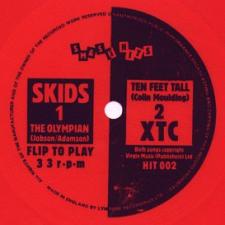
Many bands used the promotional
flexi-disc to find new audiences, and XTC were no exception, giving
“Ten Feet Tall” to ‘Smash Hits’.
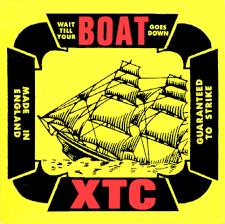
“Wait Till Your Boat Goes
Down”, issued in March 1980, failed to capitalise on the success of
“Making Plans for Nigel”.
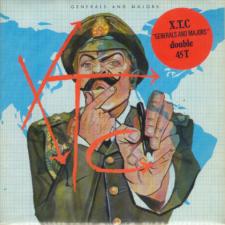
The “Generals And Majors” 45 narrowly
missed the Top 30 in 1980, despite being packaged together with a free bonus
single.
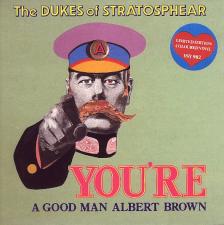
“You're A Good Man Albert Brown” failed to
chart, though XTC's venture into psychedelia as the Dukes Of Stratosphear was
a success.
After a year which had seen them score their biggest chart success yet,
embark on a disastrous tour which resulted in their giving up live work, and
losing their drummer, it is little wonder that Virgin expected the group to
fold. In anticipation, the label issued a singles collection (only
“Respectable Street” was missing), Waxworks, which was
boosted by a free LP of B-sides, Beeswax (later sold separately). It's
worth noting that the former included a different mix of “Wait Till Your
Boat Goes Down”, while a different version of “Heaven is Paved With
Broken Glass” turned up on Beeswax.
In early 1983, the new material was remixed at Air Studios and presented to
Virgin, who still felt the tapes lacked a killer single. Andy Partridge
obliged by writing a new song, “Great Fire”, which became the
band's first single in eleven months. Coupled with “Gold”, and
issued on 22nd April, the initial run came in a picture cover inside a printed
plastic sleeve. The 12" featured two extra tracks, “Frost Circus”
and “Procession Towards Learning Land”, both part of the
“Homo Safari” instrumental series.
While the next album was going through the hands of various producers,
another 45 plugged the gap. Wonderland, backed with “Gold”
[actually, the B-side is “Jump”], was initially issued as a limited
edition picture disc. . . Relations between the band and Virgin had
reached an all-time low by this time, and when it became obvious that the
company weren't going to get any further new product from the group until the
LP was issued, the label relented and Murmur [sic] finally
appeared on 31st August 1983. While the group were happy with the Alex Sadkin
mixes, the fact that four producers had been involved meant that the overall
continuity of the record suffered.
One album cut, “Love On a Farmboy's Wages”, appeared on 7" in
September, with initial quantities appearing as a double-pack with two extra
cuts, “Desert Island” and “Toys”. The 12" featured
three different songs on the B-side: “Burning With Optimism's
Flames”, “English Roundabout”, and “Cut It Out”
(a variation of “Scissor Man”), all taped at London's Hammersmith
Odeon in May 1981.
To end the year, Partridge presented the group with a yuletide song.
According to Dave, Andy wanted to disguise the group's identity, credit the
disc to the Virgin Marys and get people from the record company to sing on it.
Eventually, the name Three Wise Men was adopted, and Thanks for
Christmas appeared. . . It was generally known that Andy
Partridge was featured on the disc, though rumour had it that the likes of Phil
Collins helped out too. This was untrue, and anyway the record sunk without
trace. Very few copies reached the shops and its immediate deletion has
ensured its current collectability.
Together with drummer Peter Phipps, the group returned to Crescent Studios,
Bath, in March 1984 — where the Xmas single had been taped — to
begin work on the next album. The first fruit from these sessions was the
All You Pretty Girls single, issued on 14th September with a limited
edition die-cut sleeve. An additional track, “Red Brick Dream”,
graced the 12" edition. With its infectious chorus and big budget video promo,
the single's failure was mildly surprising. . .
Thanks to improved relations with Virgin, the album was issued on schedule
in October, and initial quantities featured a circular sleeve design and an
inner lyric bag. The Big Express was a marked improvement on
Murmur [sicg], with melodic production now giving was to a
harder, bluesier pop sound. Later that same month, a second single, This
World Over, appeared with initial quantities boasting post-holocaust
‘Greetings From’ postcards. An extended version of the A-side
turned up on 12" but the single failed to chart.
In a desperate bid for singles chart success, Virgin issued Wake
Up. . . The 12" offered value-for-money with three previous
hits, “Making Plans for Nigel”, “Sgt. Rock”, and
“Senses Working Overtime” joining the three 7" cuts.
In late 1984, Partridge was asked to produce Canadian singer Mary Margaret
O'Hara and her band at Crescent Studios. Dave: “Andy wasn't happy with
the band she had because he didn't think they were much good. He was taken off
the project after asking them to tune up, so he and John Leckie (who was also
sacked) found themselves at a loose end for three weeks.” It proved
fortuitous.
As far back as 1978, Andy Partridge had wanted to record a psychedelic
record, and his interest had been rekindled after hearing a modern psych
recording by Nick Nicely called “Hilly Fields 1892”, issued in
1982. Dave recalls: “Andy said, ‘Let's do it! I've got a few
songs.’ We could just about afford to stay in the studio for two weeks to
make this record with the 5,000 pounds Virgin gave us to do it. We taped six
songs, and it was the most fun I'd had since Drums and Wires because
there was no pressure. We could do whatever we liked so long as it was done in
one take, just like they used to in the Sixties when bands had to record an
album in three days!”
With as much vintage gear as they could find, XTC went into Chapel Lane
studios, Hereford, with their old producer John Leckie and with Dave Gregory's
older brother Ian on drums. The Dukes of Stratosphear (a name bandied about
back in the days when they were called the Helium Kidz), the guise they adopted
for this project, had five songs: a sixth, “The Mole From the
Ministry”, was written on the spot in the studio.
The resulting mini-album, 25 O'Clock, was an authentic slice of 60's
pop psychedelia and, embarrassingly, outsold the previous XTC album! The
sleeve was designed by Partridge on his kitchen table with the aid of a few
colouring pens and some photocopied 19th century lettering. “The Mole
From the Ministry”, which could easily pass for an out-take from the
Beatles' Magical Mystery Tour, was issued on 45 several weeks later, and
promoted by a film made specially for BBC West's “RPM” music
programme. Dave recalled: “That was just a piece of self-indulgent fun
and I'm glad people saw the funny side of it. Personally, I could carry on
making Dukes albums for the rest of my career, but there's only so many laughs
you can get out of one joke!”
When the laughing was over, the serious business of the next XTC album
beckoned, and they were packed off to Woodstock to work with producer Todd
Rundgren. Dave: “Todd and Andy were like chalk and cheese as
personalities, they didn't hit it off from the start. Things just went from
bad to worse. Andy was saying how much he hated the album, and when we
returned home, he was very depressed about it. My only misgiving was that it
was badly recorded. Perhaps Todd was trying to recreate a Sixties sound to
capitalise on our Beatles fixation: but having said that, Skylarking is
probably my favourite XTC album. Personally, I like what Todd did with the
songs.”
Embossed
The first single to be issued from the Woodstock sessions was
Grass. . . Two months later saw the release of the
Skylarking album . . . with the overall 60s pop sound
showing a definite Dukes of Stratosphear influence. A U.S. promo-only
interview disc, Skylarking With Andy Partridge, spiced with added
comment from Rundgren, was circulated to radio stations. . .
The next 45, The Meeting Place, spawned a clear vinyl
edition. . . Most notable, though, was the surprise U.S. hit the
band scored with “Dear God”, which had appeared on a four-track
promo 12" and was previously only available as a U.K. B-side. Virgin/Geffen
decided to add the song to future editions of the Skylarking album,
where it replaced “Mermaid Smiled”, and it was also revived for the
home market. The 12" edition boasted a rare live outing (their first since
1982), with a version of “Another Satellite” taped for a BBC radio
performance. . .
When Virgin made plans to transfer to transfer the Dukes of Stratosphear's
25 O'Clock onto CD they realized that it would be too short to issue on
its own so they asked the group to record a second album. Initially, they
weren't convinced by the idea, but when Andy Partridge penned two psychedelic
songs that couldn't possibly be recorded by XTC, they relented and spent three
weeks in a tiny studio in Cornwall, again with John Leckie at the controls and
drummer Ian Gregory.
As a taster for the forthcoming release, “You're a Good Man Albert
Brown” was released on single in July 1987. . . The album,
Psonic Psunspot, appeared two weeks later, again in a limited
multi-coloured vinyl edition. Around this time, it was rumoured that another
John Leckie-produced band, the Spys, was also a smokescreen for XTC, but this
is completely untrue.
For the first time since the early 80s, the band seemed to be in demand
again, and to capitalise on their U.S. successes, they travelled to Los
Angeles to record the next LP. For the sessions, they recruited Mr Mister's
drummer Pat Mastelotto, and spent much of 1988 in the studio. It was not
until January 1989 that new product emerged in the form of The Mayor of
Simpleton single. On the 12" flip there was an extraordinary recreation of
Captain Beefheart & the Magic Band's “Ella Guru”, which had
previously slipped out on the Fast and Bulbous Beefheart tribute
compilation LP.
Most bands only ever release one double LP set during their career, but with
a year's material in the can, XTC felt confident enough to spread Oranges
& Lemons over two discs. It caught them in a more aggressive,
optimistic mood than on previous albums and while a 60s edge was detectable,
the sound was firmly rooted in the Eighties. As an incentive to CD buyers,
initial copies came on three 3" compact discs.
Inevitably Virgin wanted the group to go out and promote the record. As
Dave explains, XTC chose to promote the record their own way: “The three
of us took our acoustic guitars to America and turned up at radio stations
offering to play skiffle versions of our new songs. It was an interesting way
of drawing attention to the record, but it was incredibly hard work, as we were
carrying guitars and luggage to up to four radio stations a day over a
three-week period. We also did a live acoustic set for MTV in front of an
audience which worried Andy a bit but he got through it. We're gradually
getting him used to audiences again!”
Crown
The second single from the album was King For a Day, written by Colin
Moulding, coupled with “Happy Families”. This appeared as a
limited edition 3" CD in a crown-shaped box, which also included demo
recordings of “My Paint Heroes” and “Skeletons”, and as
a cassette edition which resurrected two 1980 singles, “Generals and
Majors”, and “Towers of London”. This was followed by The
Loving which, despite appearing in four formats, failed to chart.
Latest reports from the band indicate that work began on a new album in
September . . . In the meantime, Andy has been producing the Lilac
Time, Dave has been doing likewise with Cud, while Colin made a surprise stage
reunion in Swindon with old colleague Barry Andrews back in May.
The Imaginary Records ‘tribute’ series has benefited further
from the involvement of XTC members: David (as David Dreams) paid homage to
Jimi Hendrix with “Third Stone From the Sun”, while he teamed up
with Partridge as Colin's Hermits for a version of “Strawberry Fields
Forever” on the “1967” compilation.
While it seems unlikely that XTC will ever record another Dukes of
Stratosphear album (the band have now developed into their apparent
alter-egos), it is hoped that the new decade will see a return to like work for
XTC. Since their final tour back in 1982, the band's music has progressed
dramatically, and they are now rightly regarded as one of the truly inventive
acts in contemporary music.
